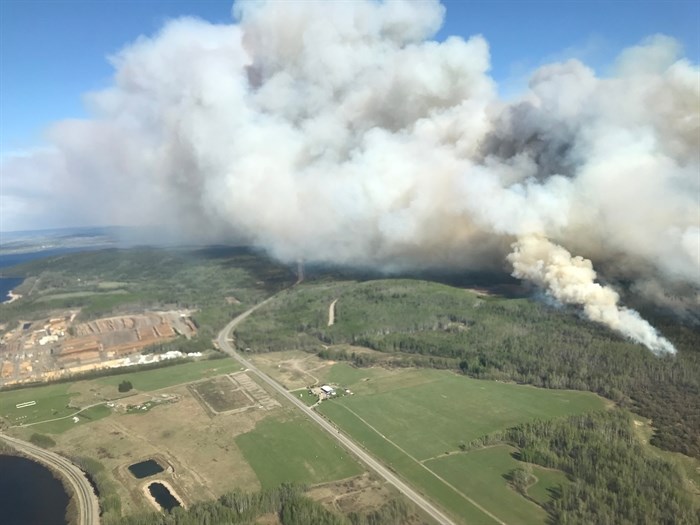
FILE PHOTO — Photo of the west side of Fraser Lake Mountain.
Image Credit: SUBMITTED/B.C. Wildfire
May 22, 2019 - 3:00 PM
KAMLOOPS — Three B.C. universities are researching how to address natural disasters in the age of climate change.
Faculty and students at Thompson Rivers University in Kamloops, UBC Okanagan in Kelowna and University of Northern B.C. in Prince George are collaborating on three projects to examine the impacts floods and fires have on watershed processes in forests, hillside slopes and Crown land, according to a TRU media release.
They also aim to understand how these disasters have affected Indigenous people’s health, with the goal to find new ways to mitigate future disasters.
“Changes in the land, air and water all effect the inhabitants of B.C.’s Interior," UNBC professor Stephen Déry says in the release. “It is essential to gauge how floods and drought impact the lives of British Columbians, particularly First Nations, who live off the land and water.”
Déry has joined the team of researchers to examine changes in climate and hydrology across key watersheds in the Fraser and Upper Columbia river basins. These areas have been affected by wildfires over the past two years.
UBCO professor Adam Wei is working with Déry and TRU’s Tom Pypker to examine the long-term effect disturbances like wildfires, mountain pine beetle infestation, timber harvesting and climate change impacts have on the hydrological systems of forests.
"Forests are critical elements in our aquatic ecosystems," Wei says in the release. "Large-scale disturbances of our forests can increase stream flow and soil erosion and consequently cause floods, landslides and other hazards that affect people and communities."
The results from Wei's research is meant to advance watershed science and provide timely results that will help B.C. manage forest disturbances and reduce or minimize severe flood and landslide threats.
A final project will examine how wildfires and climate change have increased the risk of landslides in B.C.
UBCO civil engineering professor Dwayne Tannant says assessing landslides is problematic due to the unstable nature of slope regions. Previous methods have left measuring devices destroyed in the aftermath.
Now Tannant along with TRU’s Crystal Huscroft and John Church, and UNBC’s Joseph Shea, will use unmanned aerial vehicles to perform 3D mapping of landslide areas in cooperation with Vernon-based forestry company Tolko Industries.
Images acquired from the drones will be used to visualize geomorphic features and measure the landslide geometry and movement.
“Landslides, by their nature, are dangerous places to work and many areas are inaccessible,” Tannant says in the release. “We believe that UAVs will prove to be excellent tools for assessing burn intensity, soil types and slope gradients and allow us to create accurate hazard maps for debris and mudflows.”
The three research teams expect to see results over the next two years.
“This is just the beginning of what our three interior universities are capable of when they work together to tackle pressing challenges facing the region,” Janice Larson, with Tri-University Partnership Office, says in the release.
The initiative comes after a provincially funded report from 2018 that outlines the province's need for new disaster management strategies. The report "Addressing the New Normal: 21st Century Disaster Management in British Columbia" calls for an increase in applied research in ecology, fire science, social science and economics.
To contact a reporter for this story, email Shelby Thevenot or call (250) 819-6089 or email the editor You can also submit photos, videos or news tips to the newsroom and be entered to win a monthly prize draw.
We welcome your comments and opinions on our stories but play nice. We won’t censor or delete comments unless they contain off-topic statements or links, unnecessary vulgarity, false facts, spam or obviously fake profiles. If you have any concerns about what you see in comments, email the editor in the link above.
News from © iNFOnews, 2019